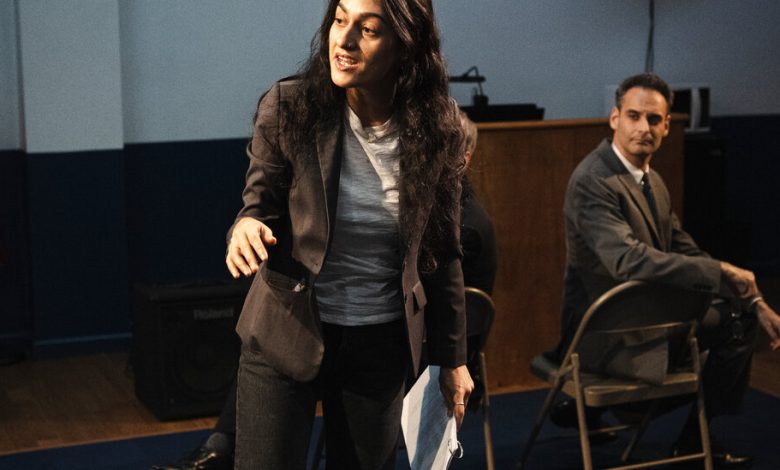‘United States v. Gupta’ Review: Father’s Trial, Daughter’s Song

“The problem with exposition is, why would you want a map when you’re trying to get lost?” asks Deepali Gupta near the start of “United States v. Gupta.”
Lost is certainly how one feels at several points of this meandering production about the trial and conviction for insider trading of Rajat Gupta — Deepali’s father and a former head of the global consulting firm McKinsey & Company. Over the course of its three hours, what is billed as a “musical tragedy” attempts to use Rajat’s trial as a dramatic trampoline for other topics: Deepali’s involuntary commitment in a psychiatric ward, the legacy of her grandfather (a freedom fighter and journalist), and the biases of business reporters.
Confusion is immediately sown when Deepali tells us, by way of introduction, “I am writing a play, and I am making an appeal. The appeal is a play. I am appealing to your humanity. I am appealing to you. I am trying to make your humanity seem appealing.” The last line throws us back on our heels: Why is it our humanity that needs to be upholstered into something appealing?
This question is never answered. And confusion reigns throughout the performance. Though based on an actual trial, characters’ identities are collapsed or otherwise destabilized. Arti Gollapudi plays all three of Deepali’s older sisters, for example, differing mainly by degrees of uptightness. To further complicate matters, Deepali addresses each of them as “Didi,” an honorific of endearment, so that it’s impossible to tell exactly which sister she’s seated next to while they watch their father’s trial.
As the musical lurches from topic to topic — the show, directed by Caitlin Sullivan, is seasick with non sequiturs — it continually defers judgment about her father. It ends on the biggest unresolved question of all: whether Rajat Gupta was “a good man.” The jury has by then made its decision, but Deepali, a songwriter and performance artist, primes us to reconsider. When she sings, about a map of India, “how malleable are our borders, how permeable are our boundaries,” she could by hymning the boundary-free nature of not just her own existence, but her father’s, encouraging us to see him as a fallible being.
Genre-wise, the play is also at war with itself. Despite its billing as a musical tragedy, it struggles to become either of those things. None of the tunes stuck out as particularly memorable, and many could be safely excised, including a nonsensical duet about SweeTarts sung by Deepali and one of her sisters.
The inclination of “Gupta” toward digression merely distracts from the main point, which becomes increasingly muddled as the work inches along. By the end, the show is stuck somewhere between takedown and tribute, between reflecting on what a daughter stands to inherit from her father’s convictions, in both senses of the word, and ceding space to the patriarch to tell his own story. “Gupta” would have benefited, no question, from a map, but even more from a compass.
United States v. Gupta
Through Nov. 28 at Jack, Brooklyn; jackny.org. Running time: 3 hours.
This review is supported by Critical Minded, an initiative to invest in the work of cultural critics from historically underrepresented backgrounds.




